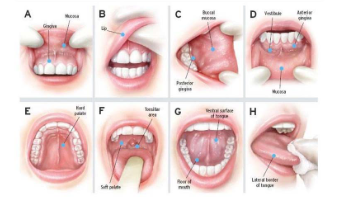The Difference Between Mouth Ulcer and Cancer

Mouth ulcers are a type of skin ulcer that can occur on the lips, gums, or inside the mouth. They are usually minor, but can become more serious if left untreated. Mouth ulcers are not cancerous, but cancer can develop from them if it is not treated.
1-What is the difference between mouth ulcer and cancer?
There are many different types of mouth ulcers, and cancer can also present itself in the mouth. So, what’s the difference between mouth ulcer and cancer?
Mouth ulcers are usually small, round, and white or red in color. They can occur on the inside of the cheeks, on the gums, or on the tongue. Mouth ulcers are often painful and can make it difficult to eat or drink. Cancer, on the other hand, can present itself in a variety of ways. It may appear as a growth, a sore that doesn’t heal, or a white or red patch on the mouth. Cancer can also cause pain, but it is often not as severe as the pain associated with mouth ulcers.
Mouth ulcers are usually benign, meaning they are not cancerous. However, in rare cases, mouth ulcers can be a sign of cancer. If you have mouth ulcer that does not heal within two weeks, you should see a doctor or dentist. You should also see a doctor if you have a mouth ulcer that is accompanied by other symptoms, such as a lump in the neck, difficulty swallowing, or weight loss. While mouth ulcers are not usually cause for concern, it’s important to get any suspicious symptoms checked out by a doctor.
2-What are the causes of mouth ulcer?
Mouth ulcers are often caused by irritation from a sharp tooth, braces, or dentures. Other common causes include viral infections, canker sores, and nutritional deficiencies. Less often, mouth ulcers may be caused by an underlying medical condition, such as Crohn’s disease, Behcet’s disease, or celiac disease.
Mouth ulcers are uncomfortable and can make it difficult to eat and drink. There are a number of over-the-counter treatments available to help relieve the pain and speed up the healing process. In most cases, mouth ulcers will heal on their own within a few weeks.
If you have mouth ulcer that is particularly large or painful, lasts for more than three weeks, or keeps coming back, you should see your doctor. They will be able to rule out any underlying medical conditions and provide you with more specific treatment options.
3-What are the symptoms of mouth ulcer?
Mouth ulcers are small, painful sores that can develop in the mouth. They are also called canker sores. Mouth ulcers are not contagious and usually heal within a week or two.
There are several different types of mouth ulcers, including:
Aphthous ulcers: These are the most common type of mouth ulcer. They usually appear as small, round sores on the inside of the cheeks, lips, or on the tongue.
Herpetiform ulcers: These ulcers are less common, but more severe. They typically appear as large, painful ulcers with a cluster of small blisters.
Traumatic ulcers: These ulcers can develop after an injury to the mouth, such as biting the inside of the cheek or lip.
Mouth ulcers can be uncomfortable, but they are not usually a cause for concern. However, if an ulcer does not heal within three weeks, it may be a sign of a more serious condition, such as oral cancer.
If you have mouth ulcer that is causing you pain or discomfort, there are several things you can do to ease your symptoms, including:
• Rinse your mouth with warm salt water several times a day.
• Avoid spicy, acidic, or salty foods that may irritate your ulcer.
• Apply a topical cream or ointment to the ulcer.
• Take over-the-counter pain relievers, such as ibuprofen or acetaminophen.
If your mouth ulcer does not improve within a few weeks, or if it appears to be getting worse, you should see your doctor or dentist for an evaluation.
4-How is mouth ulcer treated?
Mouth ulcer is treated by taking proper care of your mouth and using medication.
Mouth ulcers are usually harmless and go away on their own within a week or two. But if you have mouth ulcers more than three times a year, you may have a more serious condition called recurrent aphthous stomatitis (RAS).
RAS is treated with medication, such as corticosteroids, to reduce inflammation. Antibiotics may also be prescribed to treat mouth ulcers caused by bacteria. In severe cases, surgery may be necessary to remove the ulcer.
Proper oral hygiene is important for preventing and treating mouth ulcers. Be sure to brush your teeth twice a day, floss daily, and use a mouthwash to keep your mouth clean. Avoiding foods that irritate your mouth, such as spicy or acidic foods, can also help.
If you have mouth ulcers, you should see your dentist or doctor for proper diagnosis and treatment.
5-How can mouth ulcer be prevented?
There are different ways that you can prevent mouth ulcers from developing. Some of the most effective methods include:
- Avoiding foods that trigger mouth ulcers.
- Practicing good oral hygiene.
3.Using a soft toothbrush.
4.Avoiding tobacco and alcohol.
- Managing stress.
- Avoiding foods that trigger mouth ulcers.
Certain foods are known to trigger mouth ulcers. These include acidic fruits, such as lemons and oranges, spicy foods, and nuts. If you are prone to mouth ulcers, it is best to avoid these trigger foods.
- Practicing good oral hygiene.
One of the best ways to prevent mouth ulcers is to practice good oral hygiene. This includes brushing your teeth twice a day, flossing daily, and using mouthwash.
3.Using a soft toothbrush.
If you are prone to mouth ulcers, it is important to use a soft toothbrush. This will help to avoid irritation of the gums and soft tissues in the mouth.
4.Avoiding tobacco and alcohol.
Tobacco and alcohol are both known to irritate the mouth and trigger mouth ulcers. If you are prone to mouth ulcers, it is best to avoid these substances.
- Managing stress.
Stress is common trigger for mouth ulcers. If you are prone to mouth ulcers, it is important to find ways to manage stress. This may include yoga, meditation, or talking to a therapist.
6-What are the risk factors for mouth ulcer?
There are different factors that can contribute to the development of mouth ulcers. Some of the more common ones include:
- Stress: Stress is a common trigger for mouth ulcers. When we are under stress, our immune system can be weakened, making us more susceptible to developing mouth ulcers.
- Hormonal changes: Hormonal changes, such as those that occur during puberty, pregnancy, or menopause, can also contribute to the development of mouth ulcers.
- Nutritional deficiencies: deficiencies in certain nutrients, such as iron, folic acid, or vitamin B12, can also lead to mouth ulcers.
- Medications: certain medications, such as those used to treat high blood pressure, can also cause mouth ulcers.
- Trauma: Injury to the mouth, such as from toothbrushing or dental procedures, can also cause mouth ulcers.
- Illness: certain illnesses, such as Crohn’s disease, celiac disease, and cancer, can also be a factor in the development of mouth ulcers.
If you are experiencing mouth ulcers, it is important to see your dentist or doctor to rule out any underlying medical conditions. Treatment for mouth ulcers can vary depending on the cause, but typically involves the use of topical medications or oral antibiotics.
7-When to see a doctor?
Mouth ulcers are common and usually nothing to worry about. However, sometimes they can be a sign of mouth cancer. It’s important to know the difference so you can get the right treatment.
Mouth ulcers are small sores that can occur on the inside of your cheeks, lips, or on your gums. They’re usually red and can be painful. Mouth ulcers are common and usually nothing to worry about. However, sometimes they can be a sign of mouth cancer. It’s important to know the difference so you can get the right treatment.
Mouth cancer is a type of cancer that can occur on the lips, tongue, gums, or inside the cheeks. It’s important to catch mouth cancer early because it can spread quickly.
If you have a mouth ulcer that doesn’t heal within two weeks, or if you have any other symptoms of mouth cancer, you should see a doctor.




